Comments
-
Can we explain the mystery of existence?memorized information — Pop
Subconscious trains of thought vie for attention,
Dueling choirs competing for first place
Toward actions in the will’s ’I’—to produce
Future, for this is the main task of thought.
Who you are is your repertoire—your brain;
What you are now is the mind’s ‘eye’ of it,
Which ‘I’ e’er but obtains from who you are.
Aye, aye: the self generates what ‘I’ witness. -
Can we explain the mystery of existence?That information integrates on its own is a bit of a mind bender initially. — Pop
Subconscious trains of thoughts via for attention, and among these alternatives the brain constructs scenarios of consequences and then collapses them into the best result. -
Can we explain the mystery of existence?I think that the mystery of consciousness should not be dismissed too quickly.
— Jack Cummins
I agree. I usually take 20 minutes. :razz: — Tom Storm
Consciousness is that annoying time between naps. -
Can we explain the mystery of existence?The clue is that information integrates on its own And deep down, we identify with / as the thing that integrates the information. — Pop
Consciousness is
Intrinsic—my own, as independent;
Compositional—structured with many phenomenological distinctions;
Informational—particular and specific;
Integrated/Whole—unified and irreducible;
Exclusive—definite content, no more no less.
Subjective Features:
Referral—the ‘projection’ of neural states with no perceiving of neural firings/states.
Mental Unity—experienced as a unified field, whereas sources are all over the brain.
Qualia—the subjectively experienced felt qualities of sensory consciousness, the most perplexing gap between subjective experience and the brain.
Continuous—seamless stitching of ongoing changing contents.
Mental causation?—How can consciousness—an intangible, unobservable, and fully subjective entity—cause material neurons to direct behaviors that change the world?
Physics describes but the extrinsic causes,
While consciousness exists just for itself,
As the intrinsic, compositional,
Informational, whole, and exclusive—
As the distinctions toward survival,
Though causing nothing except in itself,
As in ne’er doing but only as being,
Leaving intelligence for the doing.
The posterior cortex holds correlates,
For this is the only brain region that
Can’t be removed for one to still retain
Consciousness, it having feedback in it;
Thusly, it forms an irreducible Whole,
And this Whole forms consciousness directly,
A process fundamental in nature,
Or’s the brain’s private symbolic language.
The Whole can also be well spoken of
To communicate with others, as well as
Globally informing other brain states,
So nonconscious parts can use what’s been made. -
Can we explain the mystery of existence?In a sense, we are an expression of the universe. — Pop
We developed brains that can take in the holistic overall view (in parallel mode) while also being able to linearly recognize the fine details and the relationships between objects. As such, so goes the universe, since we are formed in its image. So then this gives us a clue to the nature of the universe.
Seeing that the brain is divided into two hemispheres, each with their own characteristic mode of thought, which can communicate with each other, means that we are looking very deeply
Into the way that reality itself is constructed.
In other words worth repeating, we are indeed the universe come to life, made in its image—of multiplicity within unity, this scheme reflected in the holistic brain hemisphere operating in a parallel mode and joined to the other hemisphere operating in a sequential detail mode.
One hemisphere is floodlight of attention illuminating the whole scene at once, but connected to the other brain hemisphere which is a spotlight of attention moving linearly through the scene, they often alternating their cyclic reign, as the yin in the yang and the yang in the yin, making for a rounded life. -
Can we explain the mystery of existence?mystery of consciousness — Jack Cummins
Change the brain and consciousness changes too.
Take drugs and the emotions change as well.
Damage the brain and the mind’s damaged too.
Consciousness emerges only from the brain.
Consciousness is ever a brain process,
One which can be halted, never-the-less,
By anesthesia, poison/drugs,
A blow to the head, a faint, or by sleep.
In identifying consciousness,
We often confuse what is floating in
The stream of consciousness with the water itself;
Thus we note not the sea in which we ‘see’.
The brain interprets reality, and puts
A face on the waves of sound, light, color, touch,
And a sense on molecules’ smell and taste.
Consciousness is the brain’s perception of itself.
Consciousness mediates thoughts versus outcomes,
And is distributed all over the body,
From the nerve spindles to the spine to the brain—
A way to actionize without moving.
Conscious Awareness, which can but witness,
Is a safe haven from which to observe
The drama of our lives playing in our minds,
Granting us a sobering distance from it.
Being is to doing as ground is to figure
As subject is to object, as essence is to existence,
As Awareness-Consciousness is to mind-brain,
As the ultimate simplicity is to the composite.
I can never share a mind directly,
For there is no access; we are alone.
Mind melding works only for the Vulcans.
This loneliness leads us to company.
The unbearable solitude of consciousness
Is relieved by literature, social clubs,
Movies, caring, friendships, discussion, writing,
And other sharing acts, but, mostly, by love. -
Can we explain the mystery of existence?I think the big bang is well established by E=mc2, but otherwise there is so little reliable and cross verifiable information. — Pop
reflections — Jack Cummins
We are gearing up here to look at another zero-sum theory, that of Roger Ellman …
— No Source —
We are now really pretty sure that there
Was literally nothing to make anything of,
And yet there is something here, on this day,
So we do know that there must be a way.
— Logic / Science—
Logic does continue to guide us on,
But, to be complete, we’ll in the middle meet,
As also starting from the end of science—
Which confirmations must match the logic.
— Two is the Limit For Matter —
There are only two stable matter particles
In free space—the electron(-) and the proton(+),
As ever charged, although oppositely,
Along with their anti-particles, of course.
— Of Only Two Ways—
Therefore, as for electrons and protons,
There are only the two ways to make them,
As well as the two and only two ways
To make positrons and anti-protons.
— The Unstable Neutral Matter Particle—
Neutrons are not stable in free space,
For they decay, within a few minutes,
Into an electron and proton pair,
So neutrons are not as stable things.
— The Energy of the One Way—
There’s but one stable energy particle
In free space—the photon, uncharged, as neutral,
It having no anti-particle at all.
So, there’s only one way to make pure energy.
— To the Primal Base —
The base existent can’t be composite,
And certainly not fancy or complex,
For then the parts would precede. It has to
Be a simple continuous function!
— The Needle in the Haystack —
What underlies the perfect symmetry
For the electron, proton, and photon?
They and all in existence are of waves!
Waves are ubiquitous in the universe.
— Good Looking Logic —
There has to be a primal wave of ‘something,’
Opposed by a wave of ‘anti-something’,
These ‘sum-things’ canceling to nothing,
As with their derivatives and sub-waves.
— The Low Probability Event? —
These primal waves ever jiggle about,
They as their wave envelopes and sub-waves.
In some rare ‘moment’ they begin to build,
Forming a giant neutron—it’s the Cosmic Egg.
— No Infinite Density! —
10^85 waves and envelopes build up,
With 10^85 anti-waves and anti-envelopes,
And then the two cosine functions cut off,
Having reached a bandwidth limitation.
— The Birth of the Universe —
The whole shebang of the cosmic egg ‘bangs’,
It being near as large as the cosmos will be,
Although 10^9 annihilations still occur,
Leaving 2x10^76 particles as the Universe.
— All That Unfolds —
All that follows, unto today and beyond,
Is the continual unfolding of
That one big effect of the one big event
Of the beginning of our universe.
— Determinism —
Yes, all is as the ongoing continuation
Of the one and only effect, making
What we think of local cause and effect
To be but of artificial boundaries.
— The Particles —
Wave oscillations are the realest existents,
With but such as mass-energy-charge effects
Being secondary, which are still real,
Since from the realest, but not primary.
— Now We Get it! —
The electrons/positrons are the wave envelopes,
The protons/anti-protons are the waves,
And a photon is of both opposing waves,
Being 180 degrees out of phase.
— Wave Properties —
Wave length makes for mass and its extension,
While the wave frequency makes for energy,
And the wave amplitude makes for charge.
The wave is both the ‘what’ and its effects.
— The Impossible Particles —
No wonder there can be no
Stable neutral matter particles
And no stable charged energy particle;
There are no ways to make them.
— The Golden Braid —
The universe was a change in form,
But the primal essence carries on,
In the wave oscillations of the
Electron, proton, and the photon.
— The End of the Line —
Well, if the waves are the primal ‘what’,
Then the waves cannot come from another ‘what’,
But only from like math of an equation,
For that is all that is left, with nothing.
— Eternity’s Waiting Room —
The potential eternity of nothing
Could not complete, without a happenstance,
But there was also the potential
Of near infinite opportunity. -
To TheistsReligion, it seems to me, is all about that reinforcement through repetition. Of course one learns at first, and then repeats. And that's mainly it. Literate and intelligent people indeed grow away from the repetition. And most religions - all, near as I can tell - have nothing more to offer. — tim wood
Most religious preachers proclaim about 'God' as if 'God' were truth and fact, even repeatedly. This is intellectual dishonesty. -
Can we explain the mystery of existence?Still working on Not Anything… have to explore these alternate avenues for completeness…
The nonexistence of Nothing must then be
Neutral and symmetrical, totally,
While existence within nonexistence
Must be polar—as asymmetrical.
Matter/anti are each half of ‘at large’,
Being polar and opposite in charge,
While photons represent all of the cosmos,
Being neutral, as both plus and minus.
Why three space dimensions, plus one of time?
There must be three dimensions because
The singularity/nothingness demands
Existential closure—to nonexistence…
Which demands the compositional parity
Of positive and negative, as charge,
Which in turn demands that space be cubic:
Dimensionality inevitable!
The three space dimensions are compositional,
So the nullification of existence
At totality must be carried out
Via electric charge polarity,
An aspect of time, along with motion.
It could be that boundless 3D space bounds
A 4D finite hypervolume hypercube.
This arrangement is all extent (distance),
But, inside, one distance converts to time,
By the speed of light, as spacetime distance.
Hypervolume (distance^4) =
c(distance/time) * spacetime(distance^3 * time)
So, time is but internal to spacetime,
Being just a difference of space(s).
So, there is no time, then, externally,
And, internally, everything happens,
In the boundless ‘eternity’ within,
Happening over and over again,
As well as many times, too, everywhere,
In the boundless ‘infinity’ within.
The Cosmos contains its own history,
As well as its own ‘infinite’ spacetime.
Everything and every-time, both boundless,
Doth go round and round, perpetually.
Eternal causes cannot happen,
And so these must be equation-replaced:
The zero-sum balance that provides for the
Conservation laws ultimately precise.
That's All, folks! -
Can we explain the mystery of existence?Existents are not infinitely old:
The tale of their making is ever told;
They’re not unbreakable/unmakeable;
They are ‘sum-thing’—zero-sum formable.
Existents ever back to ‘no-thing’ trace,
Such as this universe, now in a race,
Even accelerating, from ‘no-thing’,
From the fuel that can never stop giving.
The null balance continues, remains, then,
As the reason things can’t be so frozen
That they don’t react, nor so fleeting
That all remains as chaos everlasting.
Confirmation abounds: as space and time,
Charge polarity, matter and its anti,
Kinetic/potential—stuff/gravity,
Smallest and largest, and reason and rhyme.
As per the explosive Big Bang Theory,
Our own ‘verse appeared, nearly instantly,
Going from not there to here, inflating—
A low probability happening.
As for ‘no-thing’, we knew it all along,
Philosophically, logically—as strong,
And now, factly—the triad that we love,
For there’s ‘no-thing’ to make anything of.
What meaning, then, of every- from ‘no-thing’?
Well, there was no option, no deciding—
Information’s content’s in the same row,
For both ‘no-thing’ and everything: zero.
… -
Can we explain the mystery of existence?All these explanations would fit the data on hand. — Pop
Investigating the zero-sum balance some more…
To comprehend the Cosmos, one must, hence,
Find the why and how of its existence,
For, incomplete answers will never dress—
Invariably wrong, by incompleteness.
Forever Stuff could not have been always,
For then there is no reason for its plays,
Its total amount, and its certain stance:
Stuff had to be created, in balance.
No thing can be eternal, never made,
As there’s no reason for the forms’ cascade;
Yet, there is ‘no-thing’ source to make it from;
So, the default ‘lawless’ is where it’s done.
The no-place of no laws is the first cause,
Requiring nothing but the same ‘because’.
Forever and always anything goes,
This being the final answer to the TOEs.
… -
Can we explain the mystery of existence?a pulsating universe — Pop
Some kind of rhythm/balance sustaining…
Our existence, necessarily, is finite,
Centered between the Largest and the
The smallest, mid-point perched, as between the
The extremes of dispersion/compaction.
(The exact middle of the large and small is about the size of a piece of dust.) -
Can we explain the mystery of existence?whatever that may be. — Pop
Is Existence a zero-balance tree
Of opposites?: matter and its anti,
The weak vs. strong force, charge polarity—
All from ‘nothing’, to form reality?
The universe weighs nothing at all: zero,
Plus it is electrically neutral.
The positive kinetic energy of ‘stuff’
Cancels the negative potential energy of gravity. -
Can we explain the mystery of existence?think about nothing — Pop
'Eternal' not coming from anything…
Seems the same as saying it's ‘from nothing’. -
Can we explain the mystery of existence?and if zero sum turns out to be true, we still have some time to fill :smile: — Pop
I am good at doing nothing and thinking about nothing…
‘ZERO’ KEEPS REARING ITS HEAD
So called ‘empty’ space is vital,
For that’s where there’s the recital
That forms and plays the tunes of reality—
This grand cosmic symphony,
As existence fluctuates with the non,
Those causeless waverings of undulation.
It was once thought that the shove
Of this total energy was of
The order of 10**120 orders of
Magnitude above.
Well if that were so near
then we couldn’t even be here;
It was the worst calculation
In all of scientification;
So we weighed the universe,
Summing all of its constituent verses.
The universe weighs nothing at all!
This too since we found that
Our universal space was B flat—
Not just via the 60 degree angles of a small triangle,
And not only by using stars,
Nor rays that went from here to Mars
To Venus and back,
But all the way back to a degree of the CMBR,
Which represented 100,000 light years,
For which we measured the curvature:
The rays didn’t converge or diverge.
The ultimate of this geometry
Is that being flat is the beautiful symmetry
That leads to yet another beauty: zero.
The ever returning, conquering hero.
…
There was no place special in time
Nor properties of reason and rhyme.
Our beloved quantum fluctuations
Left their imprint all over creation—
The signature of their emanations
Written in the CMBR’s variations—
A magnifying glass upon their revelations,
As well as in the capitals of matter congregations
Of galaxies, nebulae, and other condensations.
What underwrote this glorious expansion
From such a humble state to a big time mansion?
It’s called inflation.
Perhaps there are many such bubbles blown—
All but one of these pocket universes unknown.
Where did all this energy come from
To amount to this astronomical sum?
It comes from the gravitational field.
Our universe did not begin with this yield
Already stored in the gravitational field;
But, rather, the gravitational field can supply
The energy because its energy found
Can become negative without bound.
As more and more positive energy materializes
The forms of ever growing region sizes,
Filled with a high energy scalar field, arise,
As more and more negative energy materializes
In the form of expanding regions wielded
That are filled with a gravitational field.
There is nothing known that can place a border
On the amount of inflation that can occur
While the total energy remains exactly zero…
Why does this ‘zero’ ever become the hero? -
Can we explain the mystery of existence?Once this ball starts rolling it is difficult to stop. — Pop
Look deeper into the evident zero-sum balance of the Universe/Cosmos? -
Can we explain the mystery of existence?Because we have no access to absolutes, we must develop a relativistic understanding. :up: How fortunate this coincides with the minimum condition necessary for a state of integrated information ( consciousness ) - the relating of one thing to another,. — Pop
In his new book, 'Helgoland…', about Quantum Theory, Carlo Rovelli notes that All is Relational, that no entity exists independently of anything else, so that there are no intrinsic properties at all, but only 'properties' in relation to something else, which is essentially what Nagarjuna means by 'emptiness' in Buddhism.
Everything is 'quantum entangled' with everything, the 'things' more properly described as interactions and events.
Further, there are no fundamental substances, absolutes, no outside of Everything or bird's-eye view, no eternal basis, no 'God', etc. that is, there is no foundation of any kind to what goes on. 'Impermanance' goes all the way through…
This realization of Impermanence', 'No Absolutes' and 'Emptiness' is 'Nirvana'.
The quest is ended. -
Can we explain the mystery of existence?How long did the "Vault of Everything" take to make? — Pop
Well, some of it was a long time ago, in the cruder days of video, but it probably took a month.
I think your animated work is the strongest — Pop
What if the characters in book images could come alive and move and talk…?
I told someone looking at an illustrated book that this could be done, asking her to focus more closely.
She said, "they're not moving."
I picked up the book and moved it back and forth through the air.
"See, they're moving now."
"Ha-ha, but they're not talking."
"Put your ear really close to the page and you will hear them."
"I think I heard something."
-
Can we explain the mystery of existence?information — Pop
The Final Answer to Everything
Wild theories?
Nobody Nowhere, at first, shows that Absolutes cannot be, and then this presentation morphs into Gavin Giorbran’s showing of the confluence of grouping order versus symmetry order.
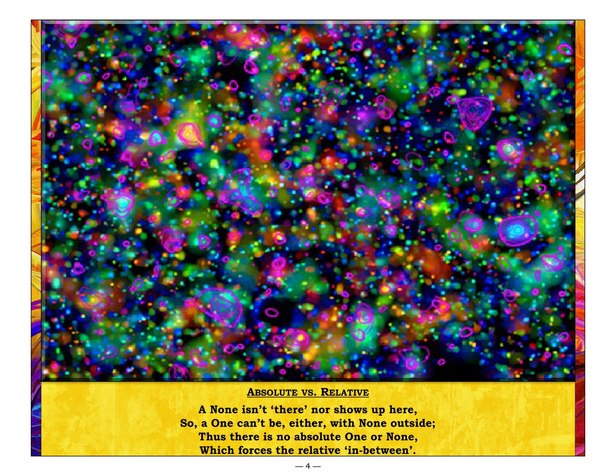
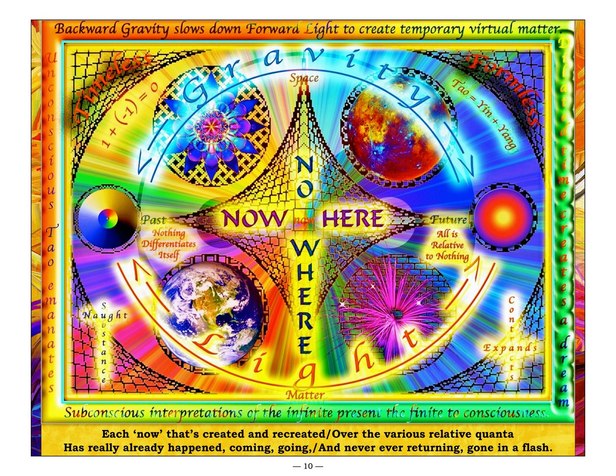
PDF: https://austintorn.files.wordpress.com/2021/07/finalanswer-11x8.5-150-dpi.pdf -
How do we understand the idea of the 'self'?I often wonder about the idea of 'self' — Jack Cummins
The self at large is the brain's repertoire of information. Like the will, it is fluid and dynamic, it changing all the time. It is what is drawn upon subconsciously by the experiential self of the moment.
In consciousness, there’s no distance between
The thing observed and what is observing.
They are, likely, one and the same, and so
It is that we seem to have a self.
The ‘I' of Awareness could be a basic
Property of existence that can but observe
The brain quale that’s currently on display,
Being a subject mostly, not an object. -
Can we explain the mystery of existence?The heroics of order overcoming disorder continue on, through record droughts and extreme heat domes… — PoeticUniverse
The print in this experimental post composed of jpgs came out fuzzy.
Here it is in a PDF:https://austintorn.files.wordpress.com/2021/07/times-blast-8.5x11-300-dpi.pdf -
Can we explain the mystery of existence?The heroics of order overcoming disorder continue on, through record droughts and extreme heat domes…
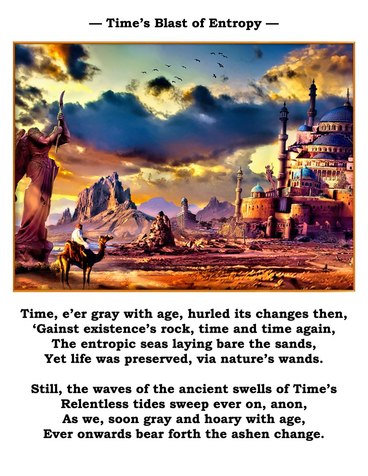
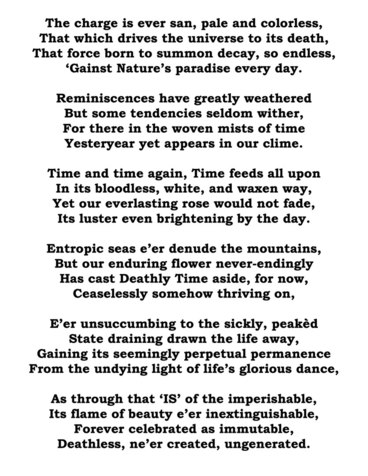
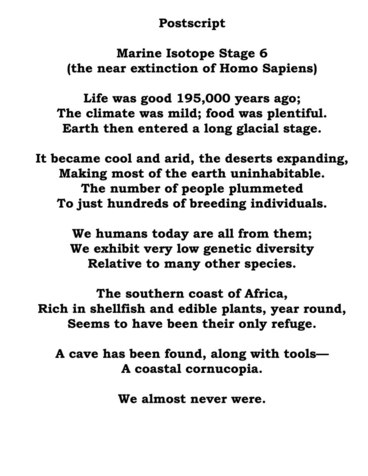
-
Can we explain the mystery of existence?Artistically its an interesting idea. — Pop
Something like 'All of life’s entities embrace one another, including cells, organisms, species, and biotope' could add to the scientific aspect. -
Can we explain the mystery of existence?This must be the first scientific poem I have ever seen — Pop
Onward and similar… 'To the Quantum Depths of the Poetic Universe':
From quantum non-locality and entanglement, we know that information is more primary than distance, and that things don’t have to have the appearance of being near each other to be related or to cause an effect.
Everything connected to everything would seem to be a ‘perception’ as far as one could be had by that network. The all-at-once connections, as like in a hologram, would seem to provide for for the direction of what goes on in the overall information process. I am thinking like a yogi and a guru, the entire cosmos situated within me.
Quantum non-locality seems to imply that every region of space is in instant and constant contact with every other, perhaps even in time as well, and so the holistic universe is governed by the property of the solitary whole; so that could be the underlying guidance principle. An individual particle might ‘know’ something about what to do, acting according to all the others.
Thus both our consciousness and the holistic universe, each having a singular nature, is the clue. Maybe they are of the same basis of fundamental consciousness, but separate as two manifestations, each controlling a different realm, such as internal and external, our internal consciousness giving us ‘future’, and the external consciousness granting ‘future’ to the universe. I don't know which has the tougher job.
Lee Smolin has it that qualia are intrinsic, as fundamental, and Chalmers has it that information is fundamental and can express itself in two ways, in consciousness and in matter.
Quantum entanglement suggests that each particle has the entire 3-D or 4-D map of the universe, the information ever updated, the universe being as a single entity. While this may not be consciousness at the level we have, it may help the universe accomplish something of the movements of particles and fields in their energy, mass, and momentum, in some global way that goes forward overall. This may not seem to be saying a whole lot, in depth, but since the quantum realm is beneath everything then one would surmise that it must have all to do with everything that goes on.
It is still that the apparent atoms and molecules make the happenings, via physical-chemical reactions; however, this observation cannot be equated to an 'explanation', for we must wonder what underlies the chemical mattering and reacting that seems to have a unity of direction to it.
…
more:
PDF: https://theomarkhayyamclubofamerica.files.wordpress.com/2021/06/quantpoe-8.5x11-jpg-150-dpi.pdf -
What is the Obsession with disproving God existence?I haven't seen you in a while - enjoy your stuff. — EricH
There's a lot lately.
Uh, oh, 'God' is joining the thread:

(Click to get it to move as kind of 3D) -
To Theistsimaginary gold coin — tim wood
The Problems of Traditional Religion
The Christian concept of reward and punishment
Handed out by an omnipotent, omniscient God,
Is derivative of the family experience—
The child and parent—a conception of our world.
God in the News
I picked up some newspapers and magazines:
A suicide bomber blew up a bus and himself as well,
Sending many of the unbelievers straight to Hell,
While assuring himself and 72 friends a place
In Heaven, a double blessing from his Faith.
His family, relatives, and friends gathered soon
To celebrate their wonderful good fortune.
The bomber’s death was especially lauded as wise,
Because he had proceeded directly to Paradise,
Bypassing the possibly troublesome way
Of the litigation of Judgment Day.
Fighting continued in Kashmir
Due to some perceived insults to Muhammad.
A man was released in Northern Ireland
After claiming to be a Protestant atheist.
A child of Christian Scientists died
Due to the religious refusal of antibiotics.
Extremists sought nuclear formulas and parts to reduce
The peril of the unbelievers in the world,
Those whose ways are not sanctioned by Allah.
Pope authorizes millions to reach
Children sexually abused by priests.
The recently discovered Gospel of Judas
Suggests he wasn’t really such a bad-ass.
Some nuclear facilities no longer exist in Syria,
About whose disappearance both Syria and Israel
Seem to know nothing.
Battles rage on over differences in some holy books.
Iran promises to destroy Israel.
President Bush led off his latest speech with
‘In God we trust.”
And in a more than 2000 year-old newspaper:
The Emperor led off his latest speech with
‘In Zeus we trust’.
And finally, in a future newspaper:
Religious extremists detonate atomic bomb
In Washington, DC;
Nuclear retaliation destroys
Twelve highly populated middle-eastern cities.
World greatly stunned, begins to widely read
‘The End of Faith’, ‘The God Delusion’,
And ‘god is Not Great’. -
What is the Obsession with disproving God existence?This idea of a magic man who created the world and who commands us is very dangerous. — Tom Storm
I next encountered all the individual Ones,
The specialized ‘Gods’ of all the Religions.
They didn’t get along at all, not even for an instant,
For all they had in common was their intolerance
Of the others’ greatly erroneous and unjustifiable beliefs
That clashed with their own, for tolerance as a relief
Was truly Not an attitude the jealous ‘Gods’ endorsed.
The followers of each ‘God’ thought that their own
Irrational embrace of myth trumped the others’ known,
And so this led to many of the religious groans.
I watched the ‘Gods’ battling for a while, steadfast,
In the present, as well as in the distant past,
Their followers’ beliefs scripting the actions,
Conflicts leading to dying for untestable propositions
About where everyone came from and was going to:
Metaphysical Martyrdoms
Conflicted with the Divine Book of Revelations.
Deuteronomy 13:7-11
Stoned those disbelieving in Yahweh,
Killing them, while the Koran eliminated some infidels.
India and Pakistan, different countries domiciled,
Because the beliefs of Islam could not be reconciled
With those of Hinduism, were poised at the brink
Of nuclear war merely because they disagreed, rife,
Over some supernatural ‘facts’ concerning the afterlife.
Karmas ran over Dogmas.
Musharraf suspended Pakistan’s constitution,
To stamp out the growing Islamic militant coalition.
Palestine’s Jews and Muslims scuffled on;
Balkan Orthodox Serbians dueled
With the Catholic Croatians,
As well as with the Bosnian
Albanian Muslims;
Northern Ireland Protestants
Warred with Catholics;
Sudan Muslims discorded
With the Christians;
Sri Lankas’s Sinhalese Buddhists
Went against the Tamil Hindus;
Caucasus Orthodox Russians
And Chechen Muslims
Exterminated each other and their kin;
Iraq’s Sunnis and Shites massacred each other
For some very slight dogmatic differences.
I interrupted their skirmishing and said in haste,
“What about tolerance and respect for other faiths?”
They all answered at once and said, in unison’s beef,
“That’s just political talk. If we tolerated other beliefs,
That would be akin to recognizing them readily
As having some credibility, which they certainly do not.
We are saved and they are all doomed, in peril;
We can’t have them exerting influence in the world.”
“So,” I said, trying to make some small talk,
“I’ve heard that You’ve each written a book
That makes an exclusive claim as to its infallibility.
“Congratulations to each of You on being published.
All have made the bestseller list;
However, I have respectfully shelved all of them
Next to the ‘Egyptian Book of the Dead’
And Ovid’s ‘Metamorphoses’,
In the contradictory book and bible section.
“Hey, how about getting modern and making a film?
I know that a book was a great thing way back,
But a moving picture is worth 10,000 still pictures
Which are in turn each worth a thousand words.”
“Indeed, we will each be divinely inspiring a movie
That will soon be playing in a theater near you.”
“Wait, Guys, I take it back,” I said with alarm,
“Are not all your children doing enough harm
By fighting over your books and morality plays?
“Will people now die for another media—the movies?”
They ignored me and fought on, with their kind,
Unable to see but through their own ‘right’ minds,
Doing the opposite of their teachings of love,
Which they were especially and paradoxically out of.
Unfortunately, they now represented the largest threat
That human kind has ever imposed against itself—
All due to differences regarding some very improbable
And differing notions about the nature of the universe. -
What is the Obsession with disproving God existence?This idea of a magic man who created the world and who commands us is very dangerous. It leads to fundamentalism in almost every country where there is God belief. People who think they know what God wants are amongst the most dangerous people on earth. That's the point. — Tom Storm
:up: -
Can we explain the mystery of existence?poetry — Jack Cummins
Poems are renderings of the soul’s spirit,
The highest power of language and wit.
The reader then translates back to spirit;
If the soul responds, then a poem you’ve writ!

(All Done Searching for the Answer to Everything)
Remember that GIFs move if you click on them. -
Can we explain the mystery of existence?It does not make any sense to talk about reality without the INFORMATION about it. — Pop

(Seeking the Ultimate Information of the Library of Everything)
The Poetic Universe
It appears to us that the world consists
Of parts continuing on from a moment ago,
And thus retain their identity in time;
Yet, matter likely only appears secondarily
As a congealed potentiality gestalt.
The sun is not the same sun as it was
A trillionth of a second ago that does.
To us a semblance of the ‘sun’ remains.
There are no objects that are identical
With themselves over time, and so perhaps
The temporal sequence remains open.
Nature is then no longer seen as clockwork,
But only as a ‘possibility gestalt’,
The whole world occurring anew each moment.
The deeper reality from which the world arises,
Acts as a unity as an indivisible ‘potentiality’,
Which can perhaps realize itself in many ways,
It not being a strict sum of the partial states.
We are both essence and form, as poems versed,
Ever unveiling this life’s deeper thirsts,
As new riches, from strokes, letters, phonemes,
Words, phrases, and sentences—uni versed.
We have rhythm, reason, rhyme, meter, sense,
Metric, melody, and beauty’s true pense,
Revealed through life’s participation,
From the latent whence into us hence.
Informationally derived meanings
Unify in non-reductive gleanings,
In a relational reality,
Through the semantical life happenings.
Syntactical information exchange,
Without breaking of the holistic range,
Reveals the epic whole of nature’s poetics,
Within her requisite of ongoing change.
Thus there’s form before gloried substance,
Relationality before the chance
Of material impressions rising,
Traced in our world from the gestalt’s dance.
All lives in the multi–dimensional spaces
Of basic superpositional traces
Of Possibility, as like the whirl’s
Probable clouds of distributed paces.
What remains unchanged over time are All’s
Properties that find expression, as laws,
Of the conservation of energy,
Momentum, and electric charge—unpaused.
The weave of ‘it from bits’ as the strokes writes
The letters of the elemental bytes—
The alphabet of the standard model,
Forming the words as the atoms whose mights
Merge to form molecules, as phrases,
Onto proteins and cells, as sentences,
Up to paragraphs of organisms,
And unto the stories of the species.
In this concordance of literature,
We are the Cosmos’ book of adventure,
As a uni-verse of sentient poems,
Being both the contained and the container.
A poem is a truth fleshed in living words,
Which by showing unapprehended proof
Lifts the veil to reveal hidden beauty:
It’s life’s image drawn in eternal truth. -
Can we explain the mystery of existence?information has to be the fundamental stuff — Pop
… In the Library of the Cosmos
Writing the Prosaic Cosmos
Capability Information is the energy/gravity
that papers the covariant quantum fields
that ink the particles of the standard model
that stroke the alphabet letters of the atoms
that word the dictionary molecules
that phrase the biotype DNA cells
that verb the subjects
that sentence the creatures
that paragraph the species
that story the ongoing tree of life
that books the literature of the unified-verse
that libraries the Cosmos.
Programming the Universe:
(Shows some pictures I took while on vacation in our developing Universe—
or else I had the best telescope and microscope.) -
Can we explain the mystery of existence?Have you ever considered whether information is the fundamental stuff? — Pop
Anton Zeilinger, in a famous statement concluded, "Randomness is the bedrock of reality", after proving it in his state of the art laboratory to a degree of 3-sigma or more.
I concluded it on the cheap by noting that the bedrock can't have any inputs to it, although I still hesitate to admit 'random'… because what is it that makes a Geiger counter not beep in between its 'random' beeps? …
I once visited the Library of Babel to see if it had any information. It contains every possible book. This entire forum was in there, too.
PDF: https://theomarkhayyamclubofamerica.files.wordpress.com/2021/07/vault-8.5x11-jpg-150-dpi.pdf
Video: -
Can we explain the mystery of existence?

The Rock Bottom Flow of Information
(It will move or else you can click on it to get it to move.) -
Can we explain the mystery of existence?I agree that the idea of a 'spontaneous production of something from nowhere' is interesting with regard to how anything ever came into existence at all. — Jack Cummins
Thus, it ought to be still happening everywhere all the time. Hope not near me, but I'll keep an eye out! -
Can we explain the mystery of existence?Not knowing the foundation of reality is a real bummer! — Pop
Yes, but we seekers shall not tire of exploration…
Why do we wander around in the dark,
In the middle of the night like this?
Well, if I knew the answer to that one,
I would have been home hours ago.
Do we not tire, e’er walking, looking, lame?
At first, we did, yes, but then beauty came—
The grand moment of wings grown; lifting, new.
The rhythm flies us—our music plays through.
Such we are stirred, so touched by the starlight,
That it seems we’ll ne’er be the same again.
Do we sense the euphony of the spheres?
Can we fathom the theory of everything?
Of we philosophers…
The Seekers Gather in the Forum Tavern
In this lost haunt on the Orion arm
Of the galaxy, safe from the core’s harm,
We philosophers meet in the forum,
The sleuth-hounds unweaving the Cosmic yarn.
We search for the Start of the Universe,
The End, the Before, the After, the Kinds,
The Measures, and All That Lies Between:
The Music of the Spheres’ Magnificat.
Quantum fluctuations e’er wave their sea,
So that Nothing can never come to be.
Here we must walk the Plank mysterious
To the min of Max into the abyss.
We’re the flesh to the backbones of the stars,
Those ghosts of the suns that no longer are—
They having transformed their energy’s ways
To base atoms, plus more—supernovae.
Heaven’s stars spread the primeval dust eterne;
Time’s deep seas to evolve the species in turn.
From time, death, and dust we at last became,
And to this, thus, and that we must return.
Time and stardust made us Earth’s living guest,
For quick death sifted the rest from the best.
Those, our birthright, wrote our epitaph, too:
RIP; time expired, death came, dust was left.
Death, evolution’s lone selector,
Stalked the sillier from the wise of yore,
Preserved the more useful from the useless,
And favored the pointed o’er the pointless.
…
From a drop of water one could infer
The existence of Niagara Falls
And even the great Atlantic Ocean.
Sherlock, even as a baby just born
In a dark cave could infer the universe
From a grain of sand between his toes.
“I love this detective school, Sherlock.”
“Elementary, my dear Watson, elementary.”
“This class of opium is great, too!”
“High school, Watson.” -
Can we explain the mystery of existence?This is a first cause, I'm not drawing any conclusions ( god ) from the cause.
Personally I believe ours would be a bubble universe caused in a larger big bang that created many universes, but this is immaterial to the topic at hand. — Pop
Either Or Poem
‘God’s’ image reflects the mottled colors
Painted by human artists upon the air
Where the wormed apple was before the fall
That rotted away truth’s tree of knowledge.
Or
The Eternal has to be everything,
Superimposed, not a certain pathing;
It can’t have inputs, with no beginning;
So, what chose the song our universe sings?
The Permanent is all that there is,
It’s transmutations the temporary fizz.
It can’t have direction, with no inputs,
So, it multi verses, seeming as a Wiz.
The Eternal is as a multiverse,
Potentially, with no information,
As in Bable’s Library of all books,
Being as useless as Nothing’s zero.
The universes might all spring forth, somehow,
Most inert or not going far enough,
With some reaching life after a long time,
Such as ours, precarious as it is.
Or
Forecasting the Cosmos
The Programmer sets the if-then switches,
Like eight-way 3D Rubic Cube intercepts,
After having set the quarks and leptons,
And coding stars to generate atoms.
Then more precise tweaks, to dark energy,
To umpteen decimal places so rare,
And the forming of the DNA code
To blend life’s ingredients, stirring slow.
Darn, the n-body problem is so tough,
For unforeseen side-effects e’er arise,
Among branches of the would-be life-tree,
A zillion variables overlapping.
Damn!
…
Extinctions swept away many a kind;
Chromosomes fused, leaving the chimps behind;
DNA remembered the survivors;
‘Good fortune’ smiled on the Sapiens mind.
Unintelligently programmed, many climbs
Had to be of the off-the-shelf reach’s grimes,
As dickering Rube Goldberg ‘inventions’,
Our nervous systems ruled by ancient times.
Finally, after some fourteen billion years,
Proto-man and then homo Sapiens
Arrived, after seven million more years
Of tinkering with monkey chromosomes.
But yet something worked; here we are!
Oh Man! What a piece of work—the mind;
What noble deeds done and undone in kind.
What coding updates programmed all upon—
In the layers of brains the mind is made upon.
What is this sapiens mammal animal?
Still made from slime but of a higher call! -
Arguments Against Godthe din — 180 Proof
An Estimate for no ‘God’
1a. All that we observe proceeds from the simplest realm of tiny events/things/processes to the larger composite to the more and complex, where we exist, which cascade may continue into the future, where/when we can expect beings higher than ourselves to become.
1b. The unlikely polar opposite of (1a) is an ultra complex system of mind of a ‘God’ being First as Fundamental; however systems have parts, this totally going against the fundamental arts.
2. (1) gets worse, for ‘God’ being, given that there can be no input for any specific direction going into the necessary Fundamental Eternal Capability—the basis of all, this bedrock having to be causeless, with random effects, due to no information being able to come in to what has no beginning. It thus appears that it could be everything possible, although not anything in particular, which is also the way it shows, in its constant transmutation at every instant, this all according to what we call the laws of nature.
3. So, (2) indicates that there is no ultimate meaning, not that a built-in meaning would be great, for it would be quite restrictive, but at least, as ‘liberating’, there’s anything and everything possible that could have become from the basic eternal state of not anything in particular—our present Earthly life path being one that is being lived now by us after 13.57 billion years, much of which progression can be accounted for by science.
4. On top of the preceding unlikelihoods, and given that obviously that no Designer made everything instantly, but is curiously constrained to doing exactly what nature could do on its own (and why so slowly!), it is unlikely that all eventualities could have been foreseen by a Deity in starting a universe suitable for life. It seems more like we were fine-tuned to the Earth.
5a. It’s still that the religious might then suppose a ‘God’ Deity who is like a scientist who throws a bunch of stuff together that is balanced and energetically reactive enough, but not too much so that it races along too fast, etc., to make for something livable coming out of it, but, again, really, what is a fully formed person-like being doing sitting around beforehand, this also being all the more of a quandary that ever enlarges the question by ‘begging’ rather than answering it.
5b. But, if it is supposed that life has to come from a Larger Life, then a regress ensues, making this not to be a good template, for it cannot be used on ‘God’ and so has to be thrown out of the stain-glass window. As for a Deity trying to put workable stuff together, this is much like the idea of a multiverse. We continue to estimate no ‘God’.
6. Existence/capability has no alternative, given that nonexistence has no being as a source and that there is indeed something, and as such the existence of something/capability is mandatory, there not being any choice to it. It’s a given; no magic required. Still, it could operate almost as what is called ‘God’, except that it’s not a Mind.
7a. We see that the One continually transitions/transmutes, never being able to remain as anything particular, which matches its nature supposed due to no information coming into it in the first place that never was, for the One Fundamental Eterne has to be ungenerated and deathless if it is so. But how can there be a finite absolute One with an impossible None outside it?
7b. Or all could be relative if there are no absolutes, for Totality can’t have anything outside it. So then Totality must be relative to itself.
7c. Of course, either way, the capability remains, as necessity, with no alternative, without needing any cause for it to be. It is the Ground of Determination — G.O.D. It has no opposite and so it is not remarkable.
8. Aside from the trivial definition of free will being that without coercion the will is free to operate, and the useless definition of the harmful random will equaling ‘freedom’, the deeper notion of ‘free’ as being original and free of the brain will is of a currency never being able to be stated and cashed in on, leaving ‘determined’ to continue to be the opposite of ‘undetermined’. This stands against a ‘God’.
While eternalism can’t yet be told apart from presentism, the message from both is of a transient ‘now’, whether pre-determined or determined as it goes along. All hope then, is crushed, both for us and the Great Wheel itself having any potency. This is the great humility; all hubris is gone.
It is enough, then, that we have the benefit of experiencing and living life well, sometimes, much more so given this modern age, although still with sweat, tears, and aversive substrates of emotions that those of the future might consider to be barbaric. The early days of humankind were horrendous.
10. It doesn’t seem like a God’s world, and so fundamentalist literalist Biblical ‘reasons’ cannot apply here, about a ‘fall’, for those already went away. The pride of being special and deserving of reward and avoiding punishment is still a nice wish, though, for us electro-chemical-bio organisms who appear be be as organic as anything else that grows in nature. Hope grants comfort.
11. God’s operations, curiously restricted to be the same as nature’s has us not being able to tell them apart from nature’s, but which is more likely, the natural or the supernatural? Earth is just where it ought to be, in the Goldilocks zone, and not impossibly flourishing out near Neptune.
12. And why must there be a truly distinct transcendent, immaterial, intangible, super realm when it would still have to give and take energy in the physical material language, talking its talk and walking its walk? Dubious, plus the speculation of an invisible realm goes nowhere toward it being so, it tending toward making excuses for what really ought to be seen everywhere.
13. So, we can sit on a fence and go to church half the time or estimate the probability either way, but note that there can be no blame for not knowing what can’t be shown for sure. It’s all in what it does for you.
Let us have wine, lovers, song, and laughter—
Water, chastity, prayer the day after.
Such we’ll alternate the rest of our days—
Thus, on the average, we’ll make Hereafter!
PoeticUniverse

Start FollowingSend a Message
- Other sites we like
- Social media
- Terms of Service
- Sign In
- Created with PlushForums
- © 2026 The Philosophy Forum










